Key takeaways:
- Embracing vulnerability and self-doubt can strengthen mentor-mentee connections and promote authentic relationships.
- Key mentoring skills include active listening, empathy, patience, constructive feedback, and questioning to adapt to individual needs.
- Finding the first mentee can occur through networking events, social interactions, or personal connections, underscoring the importance of being proactive.
- Establishing trust, clear communication, and setting expectations are crucial for nurturing a productive mentoring relationship.
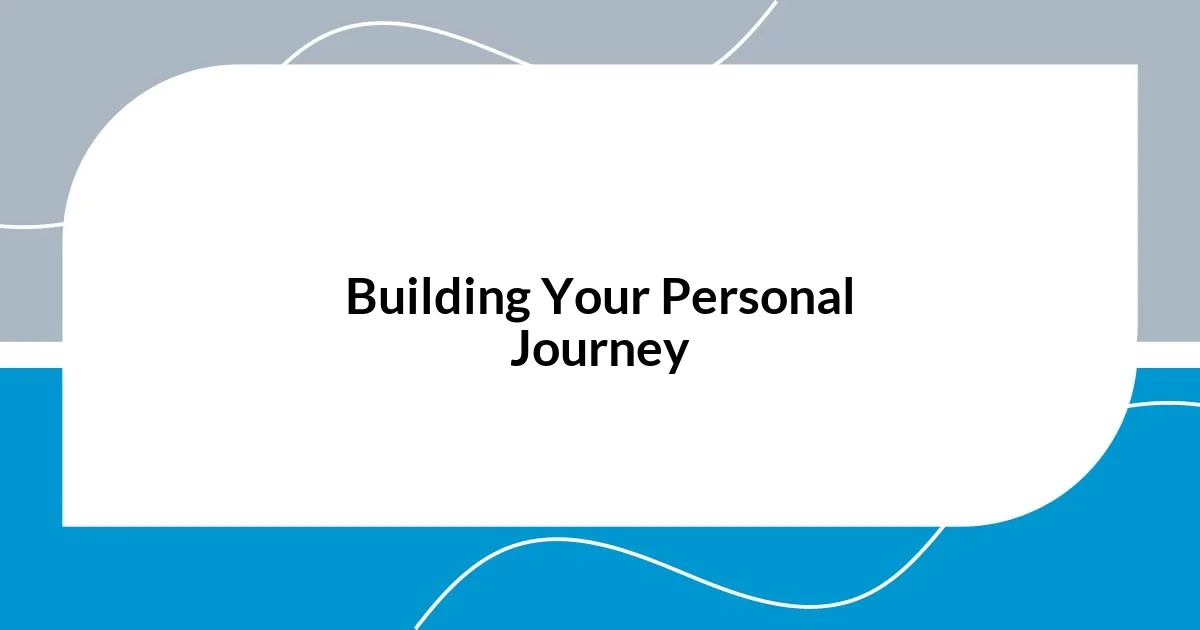
Building Your Personal Journey
Building your personal journey as a mentor is a deeply introspective process. I remember a time when I faced self-doubt while trying to guide someone through a challenging phase. It made me question whether I truly had the right tools to help them, but this experience taught me that vulnerability can be a strength. Have you ever felt unsure of your ability to mentor? Embracing those uncertainties can actually pave the way to authentic connections.
As I reflect on my path, I realize that every mentor I had influenced my growth significantly. For instance, one mentor shared their failures with me, and it really hit home. It made me think: what if sharing my own trials could help someone else on their journey? It became clear that my experiences—both good and bad—added depth to my mentorship, creating a reliable foundation I could build on.
When I embraced my journey, I turned obstacles into opportunities for growth. I vividly recall a moment when I said “yes” to a challenging mentoring role, even though it scared me. It forced me out of my comfort zone and showed me how much I could learn by simply being present and listening. How have your own experiences shaped the way you approach mentorship? Your personal journey is rich with lessons waiting to be shared.
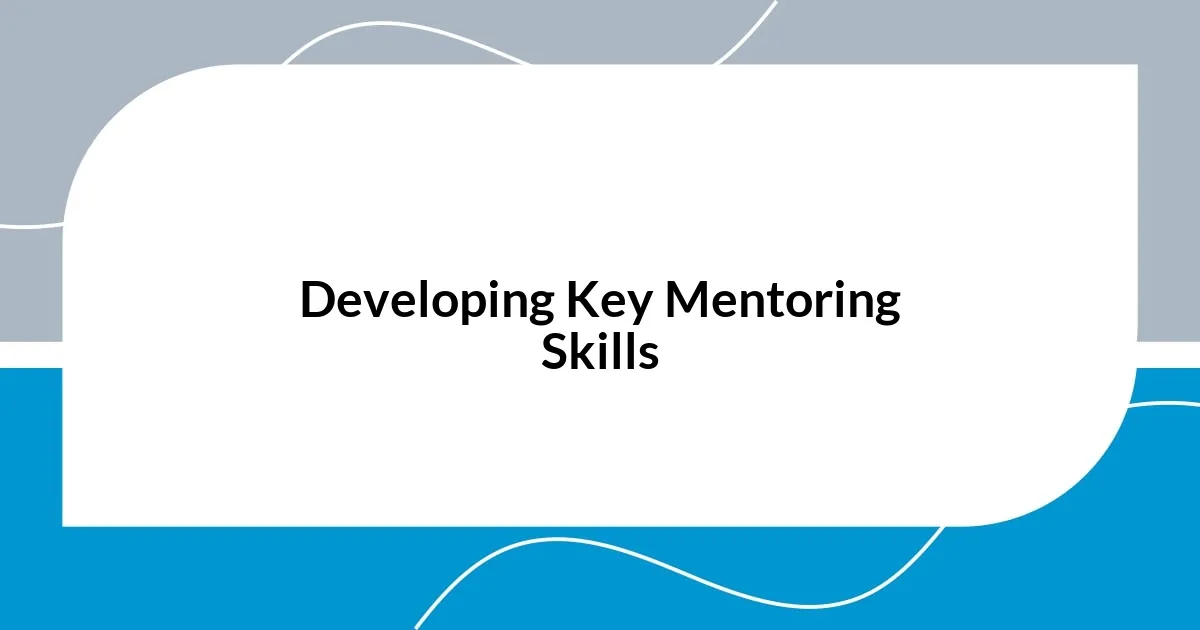
Developing Key Mentoring Skills
To become an effective mentor, I’ve learned that developing key skills is essential. One crucial skill is active listening. I remember a time when a mentee opened up about their struggles, and instead of jumping in with solutions, I paused to fully absorb what they were saying. That moment of silence led us to a deeper conversation, allowing me to tailor my guidance more effectively. By truly hearing their concerns, I created a safe space where they felt valued, which, in my experience, is crucial for building trust.
Here are some key mentoring skills to focus on:
- Active Listening: Engaging fully with what your mentee is expressing.
- Empathy: Understanding and sharing the feelings of your mentee.
- Patience: Allowing the mentee to explore their thoughts at their own pace.
- Constructive Feedback: Providing insights that help without discouraging.
- Questioning: Asking open-ended questions that provoke thought and reflection.
Mentoring is not a one-size-fits-all approach; it requires adapting to each individual’s needs. I recall a time when I had to shift gears quickly with a mentee who was feeling overwhelmed. I learned that flexibility in my mentoring style is just as critical as the skills I bring to the table. Each interaction is a chance to refine my abilities, and the journey of developing these skills is ongoing—one that I embrace with enthusiasm.
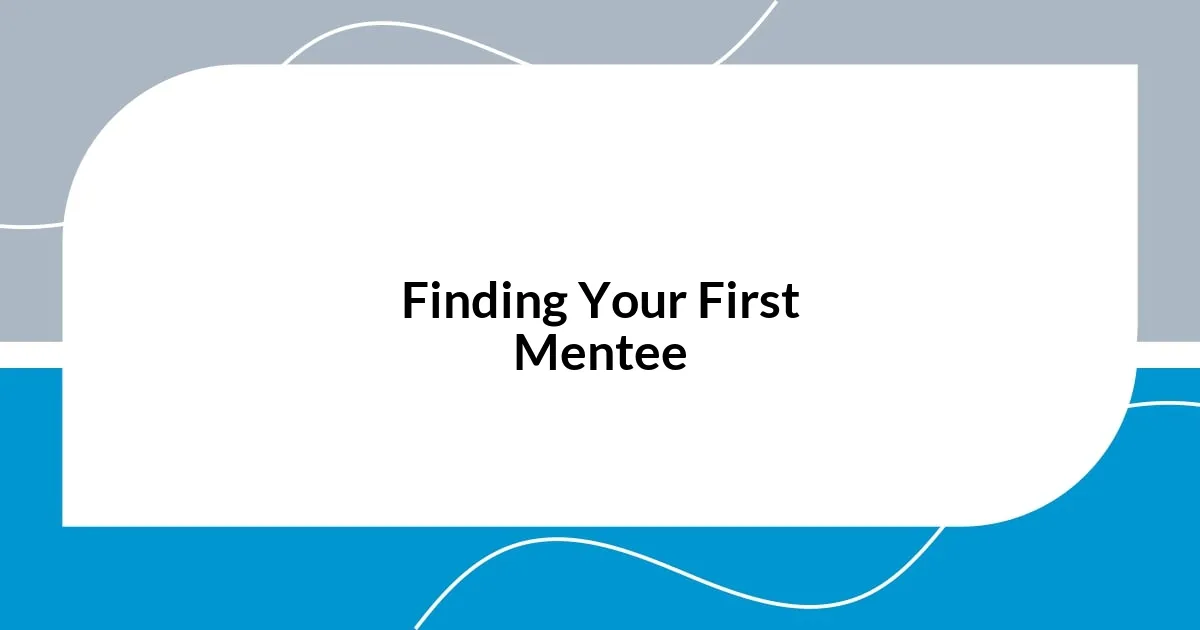
Finding Your First Mentee
Finding your first mentee can feel like a daunting task, but I strongly believe it’s about seizing opportunities when they arise. I remember attending a local workshop, where I casually mentioned my desire to mentor someone. To my surprise, a participant approached me afterward, expressing interest in guidance. That spontaneous connection turned into a rewarding mentorship, demonstrating that sometimes the best matches happen when you least expect them.
When seeking your first mentee, consider your current network. Are there colleagues or friends who could benefit from your expertise? I once reached out to a young professional I had observed struggling in team meetings. By offering a simple coffee chat, I opened the dialogue to explore how I could assist them. This proactive approach not only helped them develop confidence but also matured my perspective as a mentor, reinforcing that growth can stem from simply being available and willing to listen.
Here’s a quick comparison table that outlines different avenues for finding your first mentee:
| Method | Benefits |
|---|---|
| Networking Events | Immediate connections, shared interests |
| Professional Associations | Access to like-minded individuals, growth opportunities |
| Social Media Outreach | Broader reach, diverse backgrounds |
| Personal Connections | Built-in trust, understanding of needs |
Identifying the right mentee may take time, but I’ve learned that each interaction is a step toward constructing meaningful relationships. By being open, approachable, and proactive, you’re likely to find someone who resonates with your mentoring style. Where have you seen opportunities to make a connection?
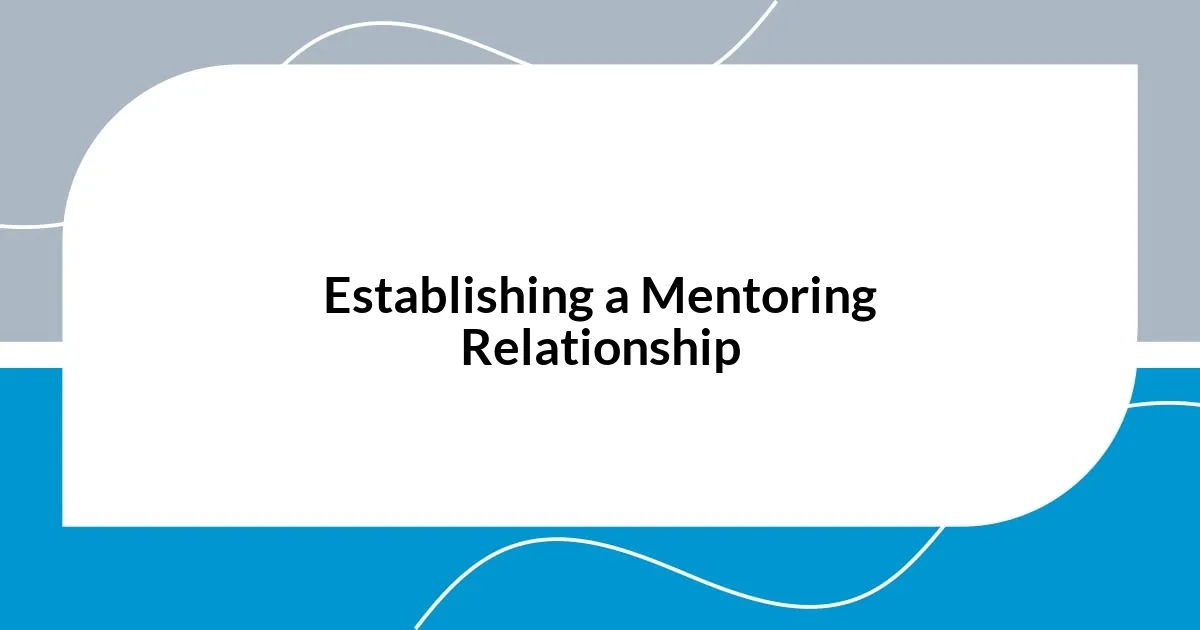
Establishing a Mentoring Relationship
Establishing a mentoring relationship begins with creating a foundation of trust. I distinctly recall the first time I met my mentee; we sat down in a quiet café, both a bit nervous. I remember making it a point to share a personal challenge I had faced early in my career, hoping it would break the ice. That shared vulnerability opened the door to honest conversations, reinforcing that it’s okay to be imperfect.
Communication is another cornerstone in this process. I find myself often asking my mentee about their goals and challenges, genuinely interested in their thoughts. For instance, after we had discussed a particularly tough project, I encouraged them to voice any doubts they had. Their openness surprised me—it revealed fears I had once felt at their age. It made me realize that fostering continual dialogue not only strengthens our rapport but also helps both of us grow.
To truly nurture the relationship, I believe setting clear expectations is crucial. Early on, I suggested we establish a regular meeting schedule, while also allowing flexibility for emergencies or changes. I still remember when we decided to check in every two weeks, which gave us both the structure to prepare but also the freedom to adjust as our lives evolved. Have you considered how setting boundaries and expectations might transform your mentoring experience? From my perspective, this clarity sets the stage for accountability and mutual respect.
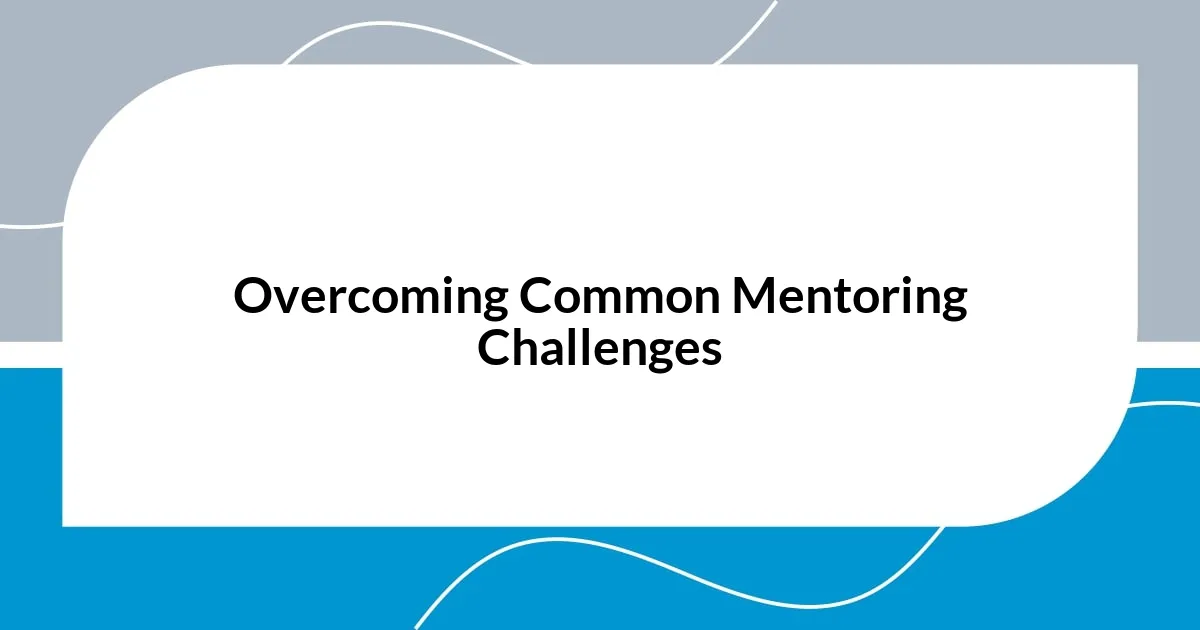
Overcoming Common Mentoring Challenges
Mentoring certainly isn’t without its challenges, but I’ve found that embracing them can lead to growth for both parties. One common hurdle is balancing my time effectively. Early on, I struggled with prioritizing my mentee’s needs alongside my professional responsibilities. To tackle this, I began mapping out my weekly schedule, deliberately allocating time blocks for mentoring. This not only ensured I was present for my mentee but also reinforced the value I placed on our relationship. How do you manage your time to accommodate mentoring responsibilities?
Another challenge I faced was navigating tough conversations. There were times when I needed to deliver constructive criticism, and I’d find myself hesitating, fearing it might harm our relationship. I recall one instance where I needed to address my mentee’s lack of preparation for a presentation. Instead of shying away, I approached it by framing my feedback as a shared learning opportunity. By focusing on growth rather than failure, I noticed a remarkable shift in our dynamic. Have you ever struggled with delivering tough feedback? I learned that honesty, coupled with empathy, can pave the way for open discussions and deeper trust.
Lastly, dealing with mismatched expectations can be tricky. In my early mentoring days, I once assumed that my mentee wanted a strict career trajectory laid out for them. I soon realized that they craved flexibility and creativity instead. Through candid conversations, we recalibrated our objectives, allowing me to adapt my mentoring style to better suit their needs. This taught me the importance of maintaining an adaptable approach. How do you ensure your mentoring methods align with your mentee’s aspirations? It’s fascinating how these discussions can create a more personalized and fruitful relationship.